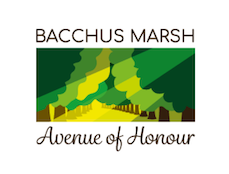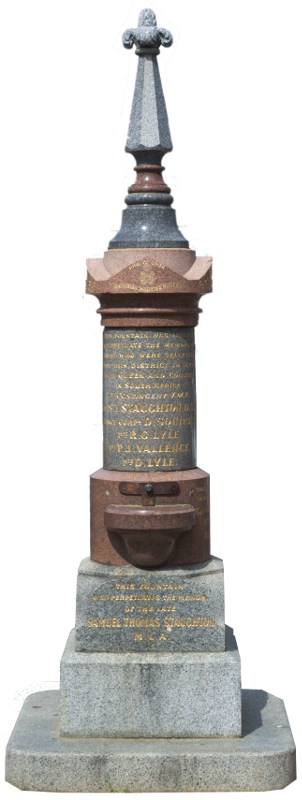SOUTH AFRICAN DRINKING FOUNTAIN.
(1901, November 16). The Bacchus Marsh Express (Vic. :1866-1918), p. 3.
Retrieved October 15, 2014, from http://nla.gov.au/nla.news-article88352395
THE ceremony of handing over the granite fountain erected opposite the postoffice, Bacchus Marsh, to commemorate the services rendered by residents in this district to the several contingents which entered upon active service in South Africa from 1899 to the present time, was carried out on Wednesday afternoon in the presence of a good muster of the public, and a parade of the V.M.R. under Captains Riddell and Staughton, and Sergeant Major Algie; also of the local Cadets, under Lieutenant Lindsay. Most of the returned soldiers were present.
Mr. J. Almond, who has acted as hon. Secretary to all the patriotic manifestations and meetings held in this district since 1899, explained to the assemblage that the fountain was the gift of the late Mr. S. T. Staughton, who was for so many years the member for West Bourke. He had asked Cr. W. Grant, as President of the Shire last year, to carry out the work on behalf of the local committee. This had been done, and Cr. Grant would hand over the fountain to the President of the Shire this year (Cr. Watson) as public property.
Cr. Grant said the late Mr. Staughton told him he would like the school children of the district to subscribe some thing towards this fountain, no matter how little, and this had been done. He would now take the flag off the fountain, and hand it over to the President of the Shire Council, which body had accepted the responsibility of keeping the fountain in repair. They were all aware that they had sustained a great public and private loss in the death of Mr. Staughton, therefore it was thought fitting to add his name to the memorial. The fountain was now public property, and he asked for three cheers for the King.
These having been given, Mr. Mark Kyle, J.P., referred to the unprecedented character of this ceremony in Bacchus Marsh. They were all sorry to miss the cheery voice and kindly face of Mr. Staughton, who had looked forward with fond anticipation to this day. He was a wholesouled Briton, most anxious, as they all ought to be, to uphold the unity of the Empire. He gave signal proof of this when he allowed his son, Captain Staughton, to risk his life as one of the first Victorians to defend the grand old flag from the ruthless hands of those who wished to banish it from South Africa. Mr. Kyle went on to describe the rallying from all parts of the Empire which had checked a European war, and much lessened its probability in the future.
Mr. T. G. Pearce said that all Australians had seen a good deal of the pomp of war in the departure and return of their soldiers, but what they had not seen, and could not realise, was the terrible personal experience which each soldier who went out had to undergo, not only in facing death in various forms, but in haying to cause death to others as their stern duty to themselves, their comrades, and their country. That was a burden of Empire which would remain with them always, and those noncombatants, on whose behalf it was undertaken, could not show too much sympathy to those who had endured it. It was fitting that this fountain should be erected, and also that it should perpetuate the name of its donor, who had done so much for the present generation that they had no need to be reminded of his services, but the record was valuable for posterity.
Captain Riddell said the fountain would always be a pleasing record of patriotism. He was proud to think that 50 per cent. of the strength of the little detachment of V.M.R, at Bacchus Marsh were among the very first in Victoria to volunteer to go to the war.
Cr. Watson said that of all the gifts the late Mr. Staughton gave to Bacchus Marsh this must stand first, on account of its object. He would have been the king of the assemblage had his life been spared to this day.
Cr. Molesworth Greene, J.P., said the death of Mr. Staughton was a personal loss, keenly felt in this district. He was a kind and enterprising colonist, and an honest statesman. This memorial would remind future generations of a most notable episode in the history of the world. The Empire was not a geographical expression merely, and Austiralians had done a noble share to prove that it was something more. The fact that all the British generals competed for the services of the Australians, and wanted more of them, was proof that their services were valuable. He thought that the Rensburg affair, where Major Eddy lost his life while the Australians were endeavouring to rescue the Wiltshires, was a most gallant action. He trusted that future generations would always remember that this memorial was erected to foster loyalty to the grand old flag that had for a thousand years braved the battle and the breeze.
Cr. G. Dickie, J.P., well remembered that it was the proudest moment of his life when young Australia volunteered to go to South Africa. They went into the hardest experience straight off, and did infinite credit to themselves and to their country and to their ancestors. The trial to their relatives was very great, as they alone knew. The late Mr. Staughton was in the thoughts of all of them on this occasion, and rightly so, for no man was more thoughtful for others.
God save the King
was sung, and the meeting dispersed. There was a scramble amnong the school children to obtain firslt drink from the fountain, and little Edie Carter secured that honour (also half a crown from Captain Staughton).
The fountain is a most artistic piece of work in every detail, and highly creditable to Messrs. Chambers & Clutten. It is circular in form, from the base upwards, and terminates in a finial of fleurdelis character. It is wholly of polished granite—grey, slate colour and red. All the mouldings and curves blend beautifully from every point of view, and the drinking tap and ladles are of nickel. The quality of the water is unsatisfactory, and it is not creditable to the local committee that they took no steps to secure a supply of rain water from the roofs of adjacent buildings. We expect that this work will have to be undertaken after a summer's experience of the short and bad supply of Werribee river water.
The projecting cornice round the top of the fountain bears the inscription on front and rear faces, in incised and gilt letters, very neatly cut and ornamented with scroll work:—
Pro Gloria.
Pro Deo et Patria. Vict.
__________________
Victorian Mounted Rifles.
The above is the motto of the V.M.R., and it was on the suggestion of Captain Riddell that these words were added, to brighten the memorial, and they have a very excellent effect. On the east and west sides of the cornice appear the letters and figures S.A. 1901.
The figures should have been 1899-01.
On the front face the inscription reads:—
This Fountain was erected to per-
petuate the Memory of those who
were selected from this District to
serve their Queen and country in
South Africa.
1st Contingent, V.M.R.(1)
Captain S. T. Staughton, D.S.O.
Lance Corpl. D. Squires.
Pte. R. G. Lyle.
Pte. P. J. Vallence.
Pte. D. Lyle.
On the reverse side the words are:—
2nd Contingent.(2)
Sergt. A. J. Tinker.
4th Contingent.(3)
Trooper G. German.
5th Contingent.(4)
W. H. Hodgson.
F. Reid.
Wm. Brimblecomb.
Wm. Serjeant.
On the front face of the fountain the inscription is placed:—
This Fountain
Also perpetuates the Memory of the late
Samuel Thomas Staughton, M.L.A.
An apology was received for the nonattendance of Mr. R. A. Crouch, M.H.R. for this district, who had a prior engagement at Geelong.
The vicinity of the fountain was very nicely decorated with flags—a line being stretched across the street, and the footpath and roadway were cleaned up in an irreproachable manner, for which thanks are due to Mr. Little.


